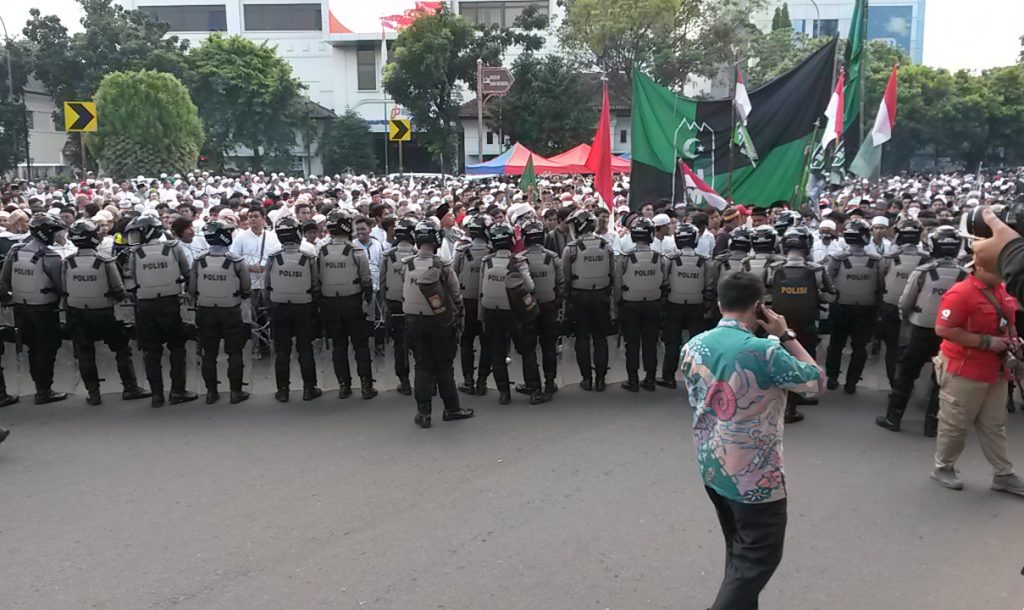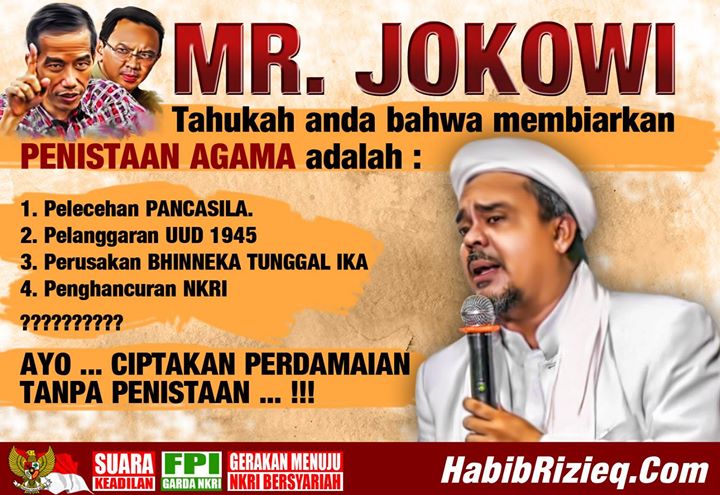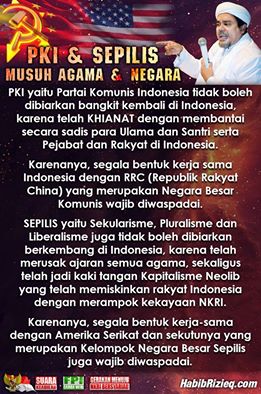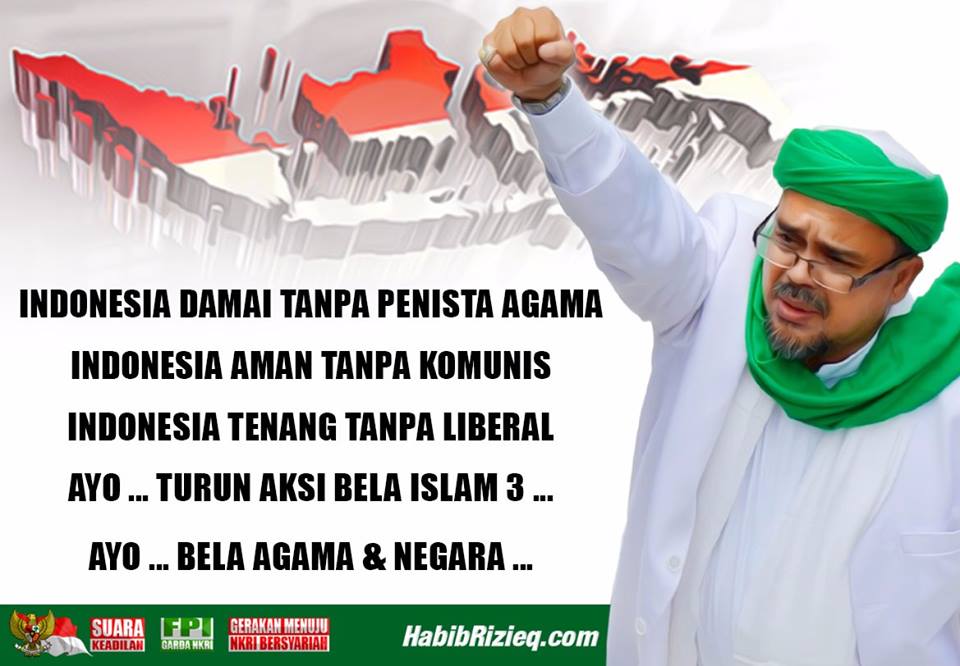How memes mobilise emotions and people.
At the end of 2016, two large demonstrations organised by reactionary Muslim groups took place in Jakarta. The protesters called for the arrest of the Christian Governor of Jakarta, Basuki Purnama, an ethnic Chinese man commonly referred to as Ahok, whom they accused of blasphemy.
The success of these events was built on the narrations, symbols and language these groups used to exploit the emotions of ordinary people – as demonstrated by the Islamic Defender’s Front (Front Pembela Islam, FPI), who played an important role in the rallies against Ahok.
Most of these people who attending the rallies were from the lower and middle class, and were less interested in theological debate than in expressing their emotions.
The role of social media in exacerbating these emotions should not be underestimated either. Many participants use social media such as Facebook, Whatsapp or Twitter, from which they get their information. For instance, Habib Rizieq, leader of the FPI, runs the Facebook page Habib Rizieq with about 370,000 followers. Some of his memes were shared more than 10,000 times and spread throughout different social media.
Habib Rizieq called for a Muslim cyber army or laskar cyber to spread the FPI’s messages in social media. A closer look at the memes spread reveals how symbols are used in them in order to stir emotions. The following describes the narrative strategies of the FPI as expressed in their memes.
Islam as a threatened religion and Indonesia as a religious state
In many memes, the need to defend Islam was highlighted. Although Sunni Islam is by far the largest religious group in Indonesia, some memes depict it as threatened by liberalism and communism. The FPI often evokes communism as a bogeyman whose adherents are aiming to eradicate religion, and makes use of the deep-rooted stigmas concerning communism in Indonesia.
In the memes, a communist threat against the Indonesian ummah is equivalent to a thread against Indonesia as a religious nation. Signs of a rising communist threat included the Bank of Indonesia logo on bank notes which looks similar to the hammer-and-sickle. In some memes communism was associated with China. Indirectly, that relation between communism and China implicated Indonesians of Chinese descent.
Moreover, conspiracy theories involving Jews, Zionism and the World Bank threatening the Indonesian ummah were quite popular among FPI members and supporters, and were also depicted in some memes.
In contrast to other reactionary Islamic organisations such as Hizbut Tahir Indonesia, which aim to establish an Islamic state beyond national borders, the FPI’s ideology is explicitly nationalist. This was depicted in memes which warned of foreign colonisers (penjajah asing dan aseng) or Chinese businessmen destructing Indonesia (cukong perusak negri). Other memes stated that Ahok’s alleged blasphemy is against the national ideology of Pancasila, violates the constitution, and is a threat to Indonesia’s unity. In many memes, national symbols such as the red-white flag, the shape of the country or the Garuda eagle appeared. The use of these symbols refered to the organisation’s topmost aim — to make Indonesia a unitary state based on Islamic law.
Social issues and reactionary critique of capitalism
Some memes refer to social issues and portray Muslim Indonesians as wong cilik (ordinary people) or pribumi (sons of the soil) in opposition to Chinese-Indonesian cukong. By doing so, they indirectly refer to Ahok’s ethnic identity. Since many supporters of the FPI are from the lower classes and experience social injustice, referring to social issues can mobilize strong emotions and sentiments against the economic elite. The absence of leftist critique concerning social inequality makes it easy for the FPI to establish their narrative on social inequality. Not surprisingly, in a FPI meme workers and students are invited to join the rally against Ahok. The reactionary anti-capitalism is most often depicted in memes requesting the ummah to draw all their money from the banks which were described as enemies of ummah.
Hostility towards the Jokowi-government
In many memes, the Jokowi government is accused of protecting Ahok and of being hostile to Islamic movements. The government is referred to as “the Jokowi regime” (rezim Jokowi) and the term rezim has a clear negative connotation here. In some memes, Habib Rizieq addressed President Jokowi as “Mr. Jokowi”, a title usually used for foreign people. The hostility towards the Jokowi administration makes the FPI an ally for political forces in conflict with Jokowi, particularly the political elite close to Prabowo and Susilo Bambang Yudhoyono.
The FPI has its own political agenda, clearly expressed in their contributions in social media. The organization has proven through vigilant actions that violence for them is a legitimate means in the struggle for shariah law. However, within large parts of the Muslim community of Indonesia, perception concerning the FPI is not one of a violent or dangerous group and there have been no serious attempts by the government to ban the FPI. Rather, the organization gained legitimacy through its claim to protect the Muslim faith and defend religion as one of the fundamentals of the Indonesian state. Their enemies, such as liberalism, Chinese businessmen, communists or other opponents of the ummah depict the constitutive outside of reactionary Islamic identity and more and more of religious national identity. The state of Indonesia is referred to as a guardian of Islam, but the current government is alleged to fail in that role. The question is, however, if the political elite seeking support from the FPI is also willing to help in achieving the goal of establishing shariah law in Indonesia.
Timo Duile is researcher and lecturer at the Institute for Oriental- and Asian Studies at Bonn University, Germany. He studied political science, philosophy and cultural anthropology and obtained his PhD in Southeast Asian Studies. For his doctoral thesis he conducted fieldwork in West Kalimantan, Indonesia, during which he was a guest researcher at the Universitas Tanjungpura in Pontianak, Indonesia. His research focuses on environmental conflicts, identity politics, processes of democratization, and postcolonial theories.
 Facebook
Facebook  Twitter
Twitter  Soundcloud
Soundcloud  Youtube
Youtube  Rss
Rss 



